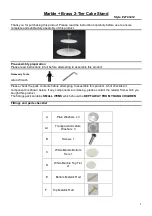
11
Hints and Tips
Condensation and steam
When food is heated it produces steam in the
same way as a boiling kettle. The oven vents
allow some of this steam to escape. However,
always stand back from the oven when
opening the oven door
to allow any build up of
steam or heat to release.
If the steam comes into contact with a cool
surface on the outside of the oven, e.g. a trim, it
will condense and produce water droplets. This
is quite normal and is not a fault with the oven.
To prevent discolouration, regularly wipe away
condensation and also soilage from surfaces.
Cookware
Use any ovenproof cookware, which will
withstand temperatures of 250
°
C.
Oven dishes, etc. should not be placed
directly on the oven base.
Oven Cooking
·
Turn off the oven 5 minutes before the end of
cooking time, and use residual heat to
complete the cooking.
·
The thickness, the material and the colour of
the pan will influence the cooking results.
·
When cooking, certain dishes increase in
volume, ensure the pan is large enough.
·
To prevent fat dripping when roasting use tall
rim pans proportional to the item being
roasted.
·
Prick the skin of poultry and sausages with a
fork before cooking to avoid spitting.
Use heatproof glass dishes for soufflés.
The effects of dishes on cooking results
Dishes and tins vary in their thickness,
conductivity, colour, etc. which affects the way
they transmit heat to the food inside them.
A
Aluminium, earthenware, oven glassware and
bright shiny utensils reduce cooking and base
browning.
B
Enamelled cast iron, anodised aluminium,
aluminium with non-stick interior and coloured
exterior and dark, heavy utensils increase
cooking and base browning.












































